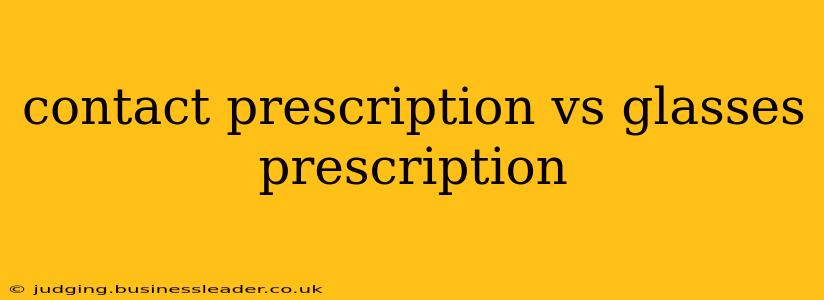Choosing between contact lenses and glasses often comes down to personal preference, lifestyle, and vision needs. However, understanding the differences between contact lens and glasses prescriptions is crucial for ensuring optimal vision correction. While both correct refractive errors, the prescriptions themselves aren't interchangeable. This article will delve into the key distinctions and answer common questions surrounding contact and glasses prescriptions.
What's the Difference Between a Contact Lens and Glasses Prescription?
The most significant difference lies in how the prescriptions measure and account for the position of the corrective lens relative to the eye. Glasses prescriptions are measured with the lens positioned approximately 12-14mm in front of the cornea (the front surface of the eye). Contact lenses, on the other hand, sit directly on the cornea. This difference in distance profoundly impacts the calculation of the refractive power needed to achieve clear vision.
A glasses prescription usually includes the following parameters:
- Sphere (SPH): Corrects for nearsightedness (myopia) or farsightedness (hyperopia).
- Cylinder (CYL): Corrects for astigmatism (irregular curvature of the cornea).
- Axis (AX): Indicates the orientation of the astigmatism.
- Add: For reading glasses, this accounts for near vision correction.
A contact lens prescription mirrors these elements but might also include additional parameters:
- Base Curve (BC): Refers to the curvature of the lens, crucial for proper fit and comfort.
- Diameter (DIA): The overall size of the contact lens.
- Material: Specifies the type of contact lens material (e.g., silicone hydrogel, hydrogel).
- Replacement Schedule: Indicates how often the lenses need to be replaced (e.g., daily, weekly, monthly).
Can I Use My Glasses Prescription for Contact Lenses?
No, you absolutely cannot use your glasses prescription for contact lenses. As explained above, the different positioning of the corrective lens requires a different calculation of power. Using a glasses prescription for contacts can lead to blurry vision, eye strain, and even discomfort. Always get a separate contact lens prescription from an eye care professional.
Why Do I Need a Separate Contact Lens Exam?
A comprehensive eye exam for contact lenses is necessary for several reasons:
- Precise Measurements: The exam involves precise measurements of your cornea's curvature and other parameters essential for selecting the correct contact lens fit.
- Lens Fitting: Your eye care professional will evaluate the suitability of different lens types and materials based on your eye health and lifestyle.
- Health Assessment: The exam assesses the overall health of your eyes to determine if you're a suitable candidate for contact lenses. Certain eye conditions might preclude contact lens wear.
- Proper Instruction: You'll receive proper instruction on contact lens insertion, removal, care, and hygiene, minimizing the risk of complications.
What Happens During a Contact Lens Fitting?
During a contact lens fitting, your eye doctor will:
- Measure your cornea: Using instruments like a keratometer, they'll determine the curvature of your cornea.
- Assess your tear film: The health of your tear film is crucial for contact lens comfort.
- Evaluate your eye health: They'll check for any conditions that could affect contact lens wear.
- Trial different lenses: They'll let you try different lenses to find the best fit and ensure comfort.
Is it Cheaper to Get Glasses or Contacts?
The cost of glasses versus contacts depends on several factors, including the type of lenses, the frames chosen (for glasses), and the frequency of replacement (for contacts). While glasses might seem cheaper upfront, the ongoing cost of contact lens solution and replacement lenses can add up over time.
Can I Buy Contact Lenses Online Without a Prescription?
No, you should never buy contact lenses online without a valid prescription from your eye doctor. Wearing ill-fitting or inappropriate contact lenses can lead to serious eye problems, including infections and vision impairment. Always prioritize your eye health and obtain a prescription before purchasing contacts.
This information is for educational purposes only and should not be considered medical advice. Always consult with your eye care professional for personalized recommendations regarding glasses and contact lenses.
